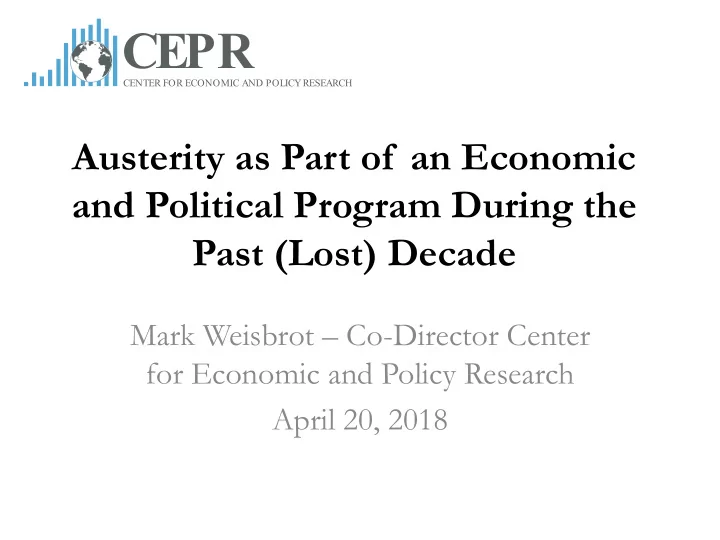

CEPR CENTER FOR ECONOMIC AND POLICY RESEARCH Austerity as Part of an Economic and Political Program During the Past (Lost) Decade Mark Weisbrot – Co-Director Center for Economic and Policy Research April 20, 2018
• Austerity can be part of a political agenda which has a set of goals • A clear example is the Euro Area in 2011-12 CEPR CENTER FOR ECONOMIC AND POLICY RESEARCH
• Until summer 2012, when Mario Draghi effectively guaranteed Spanish bonds, threat of a financial meltdown caused recurrent crises and extended recession. • Draghi’s famous 3 words: “whatever it takes.” • “Within our mandate, the ECB is ready to do whatever it takes to preserve the euro. And believe me, it will be enough.” July 26, 2012 CEPR CENTER FOR ECONOMIC AND POLICY RESEARCH
Interest Rates on Spanish 10-Year Government Bonds 8 7 6.795 6 5 Percent 4 3 2 1 0 2007-01 2008-01 2009-01 2010-01 2011-01 2012-01 2013-01 2014-01 2015-01 2016-01 2017-01 2018-01 Source: OECD CEPR CENTER FOR ECONOMIC AND POLICY RESEARCH
• European authorities could have acted much sooner but didn’t. • Why? They were using the crisis to push for changes in fiscal, labor market, social, and other policies. Changes that people in the affected countries would not generally vote for. CEPR CENTER FOR ECONOMIC AND POLICY RESEARCH
• IMF Article IV consultations are evidence of the Fund’s political agenda for Europe, mostly shared and determined by European Authorities (European Commission, Euro Group of Finance Ministers, ECB) • It is the attempt to achieve this political agenda – not debt dynamics or financial markets -- that had Europe in crisis and recession, with mass unemployment for about two extra years (as compared to the US) CEPR CENTER FOR ECONOMIC AND POLICY RESEARCH
IMF Article IV Consultations in Europe • Based on a content analysis of 67 Article IV agreements for four years from 1 January 2008 between the IMF and EU countries. • Focus on medium-term policy recommendations in fiscal adjustment, inflation targeting, employment generation and social protection. CEPR CENTER FOR ECONOMIC AND POLICY RESEARCH
Evidence of a consistent pattern of policy recommendations: • Macroeconomic policy that focuses on reducing spending and shrinking the size of government, regardless of whether this is appropriate or necessary. CEPR CENTER FOR ECONOMIC AND POLICY RESEARCH
Evidence of a consistent pattern of policy recommendations: • A focus on other policy issues that tend to reduce social protections for broad sectors of the population (including public pensions, health care, and employment protections), reduce labor’s share of national income, and possibly increase poverty, social exclusion, and economic and social inequality. CEPR CENTER FOR ECONOMIC AND POLICY RESEARCH
Fiscal Adjustment • Recommended for all 27 EU countries. • Spending cuts preferred to higher taxes. • Emphasis on cutting public pensions and “increasing the efficiency” of health care expenditure. CEPR CENTER FOR ECONOMIC AND POLICY RESEARCH
Labor Market Reforms • Increase in unemployment over the time frame of the study. • Measures suggested include: reducing eligibility for disability payments or cutting unemployment compensation, raising the retirement age, decentralizing collective bargaining. • Overwhelmingly focused on measures that would directly reduce wages or would create downward pressure on wages. CEPR CENTER FOR ECONOMIC AND POLICY RESEARCH
Labor Supply • Recommendations to increase labor supply irrespective of unemployment or labor force participation rates • No apparent correlation between recommendation to increase the labor force and a country’s labor force participation rate or unemployment rate. CEPR CENTER FOR ECONOMIC AND POLICY RESEARCH
Healthcare • A total of 26 consultations for 15 countries explicitly mentioned health care policies. • Health care policy advice was usually framed in terms of budget consolidation. • For 14 of the 15 countries, recommendations were for decreased spending on health care CEPR CENTER FOR ECONOMIC AND POLICY RESEARCH
Pensions • The IMF offered advice on pensions for 22 out of 27 countries reviewed. • Pension recommendations were frequently referenced in the context of fiscal consolidation and focused on reducing pension spending in every single case by tightening eligibility, raising retirement ages, increasing service period, reducing benefits levels (often through tightening pension indexation), and phasing out early retirement programs . • Several consultations advocated expansion of private pensions to supplement cuts in public pension. • No correlation between life expectancy and recommendations to increase the retirement age or scale back pensions. CEPR CENTER FOR ECONOMIC AND POLICY RESEARCH
Low and Middle-Income Countries • We examined 41 IMF agreements in 2009 (world recession) • At least 31 of 41 agreements had pro-cyclical policies • Part of the problem is governance: high-income countries (US and allies) control the IMF • US has veto over many important policies that require 85 percent majority • OECD has more than 60 percent of votes due to overrepresentation of high income countries CEPR CENTER FOR ECONOMIC AND POLICY RESEARCH
Current IMF Voting Shares OECD Countries Brazil, Russia, India, China Rest of World Source: IMF CEPR CENTER FOR ECONOMIC AND POLICY RESEARCH
Recommend
More recommend